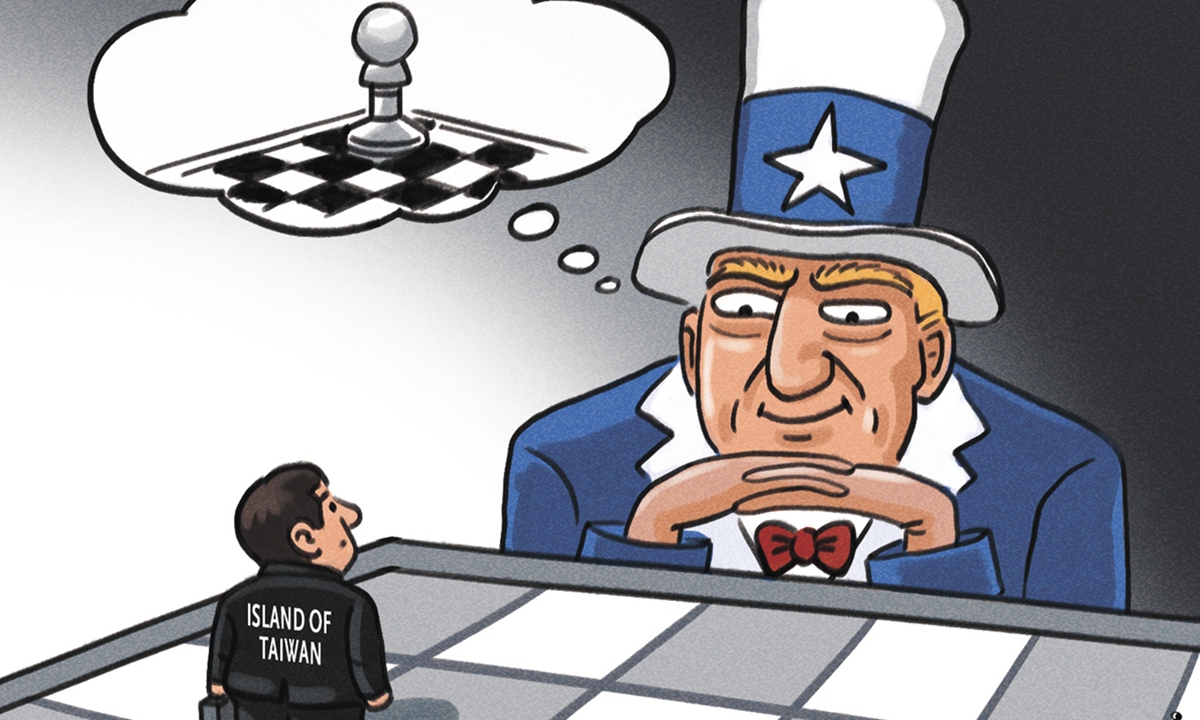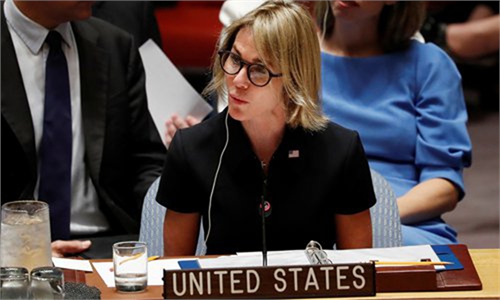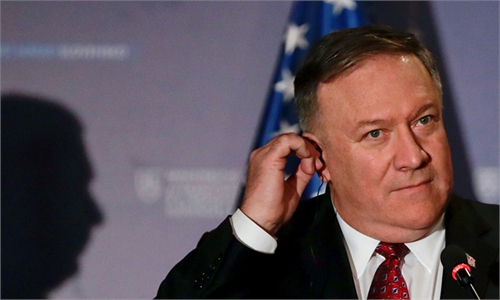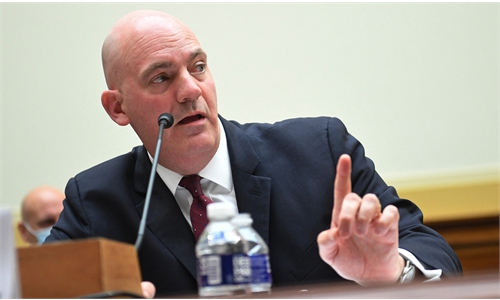
Illustration: Liu Rui/GT
Editor's Note:The US State Department on Tuesday called off all of its travel for the final eight days of the Trump administration, including US Ambassador to the UN Kelly Craft's planned trip to the island of Taiwan. It said that the move was done to support the presidential transition of the incoming Biden administration. Was that the real reason? What does such a decision mean? Have there been any changes in US domestic politics? Two Chinese scholars on Taiwan question shared their views with the Global Times.
Zhang Hua, an associate research fellow of the Institute of Taiwan Studies, Chinese Academy of Social Sciences
It appears to be part of the power transition between the administrations of Trump and Biden. In the aftermath of the Capitol riots last week, the pace of power transition has accelerated.
China's opposition may also have contributed to the cancellation of the Taiwan trip. When US Secretary of State Mike Pompeo announced Craft's visit to the island, Chinese Foreign Ministry Spokesperson Hua Chunying on January 7 reiterated China's stance by saying that "China firmly opposes any forms of official exchange between the US and the Taiwan region." Both administrations of Trump and Biden must have felt pressure from China.
The incoming Biden administration is aware that if it indulges the Trump administration to undermine China-US ties and play with fire on the Taiwan question, the one in trouble will be the Biden administration itself. From the perspective of US national interests, Biden should take effective measures to prevent the madness of the Trump administration from endangering his own.
However, Trump's aggressive moves in terms of the Taiwan question may serve the interests of the Biden administration as long as they don't cross the red line. They can be regarded as the Trump administration's diplomatic legacy. In this scenario, Biden can have more bargaining chips in terms of the Taiwan question to negotiate with China. In this context, China's response is of great significance. If it comes as remarkable, Biden will know where China's bottom line is and make steps backward.
The cancellation of the Taiwan trip also sends a strong signal that the US will never fight for Taiwan. Taiwan is far away from the US, and the US will not start a comprehensive competition and confrontation against the Chinese mainland for the sake of protecting the island. Taiwan must have seen such a sign as well. But due to the political interests of Taiwan authorities or Taiwan secessionists, they have pretended not to see it.
In other words, Taiwan secessionists will use China-US strategic competition to achieve their political goals and push their agenda forward. In fact, the US and Taiwan secessionists have been taking advantage of each other. It is just that they have different goals - the US wants to gain the upper hand in the strategic competition with China, while Taiwan secessionists want to separate Taiwan from China.
Judging from Biden's statements, the US under his administration will still adhere to its one-China policy. But the policy is different from China's one-China principle. The US' one-China policy has some negative connotations - it includes the Taiwan Relations Act. But it does not include the "Six Assurance" Trump touted.
Biden's position on the Taiwan question may be softer than that of Trump, but he will not change the course of using Taiwan to contain the Chinese mainland, nor will Biden stop selling arms to the island and supporting Taiwan's participation in international organizations. He would also allow Taiwan officials to visit the US for non-public or personal exchanges.
China needs to make clear its diplomatic stance when being provoked by the US. Behind each diplomatic statement, there is China's pressure on the US at different levels. The US can feel it as well. China does not hope the Taiwan question becomes a major factor that influences the trajectory of China-US relations. To maintain peace and stability across the Taiwan Straits, we must first focus on the whole picture of China-US relations.
Gao Yang, a research fellow at the Beijing-based China Center for Contemporary World Studies
Judging from the US' official statement, the cancelation of the trip was a result of the changes in its domestic politics. As a matter of fact, it was triggered by domestic political struggles.
Craft's previous high-profile announcement to visit Taiwan was to ostensibly display US' hard-line stance toward China. But it actually was also an attempt to make obstacles for the Biden administration's China policy, as the Taiwan question is a linchpin issue.
After Biden takes office on January 20, many anticipate that he will continue the hard-line stance toward Beijing, and there will be evident step back on his policy toward the island.
As world's two largest economies, there is no real potential for them to entirely decouple with each other. According to his governance agenda, Biden needs China's support and has to cooperate with China on a bunch of international affairs. With these scenarios, Biden will be reluctant to see Trump team's final policies toward China constrain his own adjustments.
The calling off of Craft's visit to Taiwan can be regarded as part of Biden's foreign policy team's attempts to begin the implementation of its new policies.
The incoming administration will return to multilateralism, and rejoin many international organizations in a bid to offset the negative effects of the Trump's wild withdrawal from them.
The Biden administration believes that the US should play a leading role in the building of a sustainable international order and set global agendas. Otherwise, there will be huge opportunities for China to create alternative patterns to the US model.
Biden's team believes that the global impact of US values is also crucial to its national interests. In the future, it will position its "values" as strategic priorities.
As such, the Chinese government should keep a sober head: The Biden administration will resume the diplomacy of ideological values. In this domain, China completely differs with the US in terms of how these concepts are defined. This may make their conflicts and divergences irreconcilable.
The incoming government will likely press China on Xinjiang, Hong Kong, Tibet and Taiwan in terms of human rights, democracy and freedom. Under the banner of defending democracy, the US is likely to solidify its stance with like-minded countries to contain and pile more pressure on China.
US' rationale for using the island of Taiwan as a pawn to contain China will remain the same. But for the Chinese mainland, the change in US policy toward the island will not have much impact. After all, the initiative to achieve reunification is now firmly in its own hands.
For the Taiwan authority, the change of US policy will deliver a blow to some of the urgency certain separatists have pushed for Taiwan's secession. What the Chinese mainland needs to do is to continue to improve its comprehensive national strength and military capabilities, enhance its overwhelming advantages over the island and maintain strategic resolve in the face of provocations from the US and the island.
It is also worth noting that there are still a number of politicians in the US who are trying to use the Taiwan question to interfere with China's development. They are seeking to undermine the mediation of China-US relations while pursuing personal political interests.
Biden's China policy will not mean that Washington is dropping a hard line on China. It is just a tactical shift. The future of China-US relations will still be characterized as competition and struggle.



